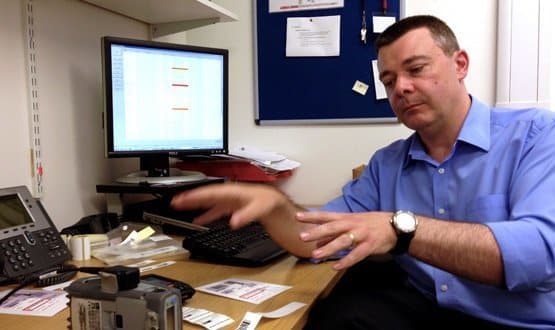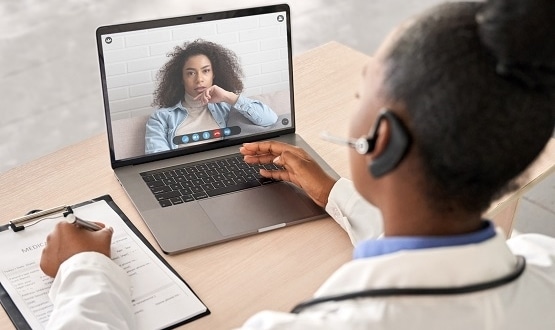Simon Noel: The Accidental CNIO
- 10 October 2023

Making the move from a clinical role into a digital leadership position can be daunting. Simon Noel explains how he did it – and calls for a more ‘nuanced’ understanding of the digital clinical specialist role
How did I come to be in this role?
Like most people who go into digital healthcare roles, this was not the career pathway I had envisaged for myself when I came into nursing. After working in adult intensive care for 13 years, I was asked to take over managing our critical care information system, because I was ‘techy’. The transition was frightening. But having had to undertake a procurement for a new system, and project manage an intensive care refurbishment, I decided I was a bit ‘techy’ and ended up enjoying the experience.
Following some time working in project development for NHS Blood and Transplant, the Global Digital Exemplar Programme presented me with the CNIO opportunity. Going into post was a challenge: the role was very new. Inside the trust there was a lack of insight about how to support the post, while outside the organisation there was almost an echo of silence as other CNIOs were also forming their roles. The newness of the role and a lack of structured guidance meant that there was no sense of direction about how to develop and where to go to find this information.
How did it develop?
Largely I had to work this out for myself. This meant building the team, and working around the system to understand what was available, and what was needed, to make digital an effective and accepted specialist role. I had to see the potential of the (digital) team, but also work with the organisation to help others understand the benefits of this new professional group.
Another challenge was developing team members with the limited range of opportunities to hand, and the need for organisational buy-in to see how this development would add value, clinically, operationally, and financially.
Two relationships proved to be central to success: first, the chief nurse cemented our place in the corporate nursing team and recognised us as a central component to safe and effective delivery of care. But we also asked for an objective assessment from outside the trust. Helen Balsdon, then the CNIO at Cambridge, confirmed our direction was effective, and provided a link to the wider digital community, ultimately leading to my role on the CNIO Advisory Panel.
What have I learned?
Things have come a long way; we have gown as a team, and we are seen by our organisation as a pivotal clinical specialist asset. The community of CxIOs out there has evolved and is much more mature.
There are some key messages all new CxIOs should know:
1. You are not alone
Do not think for a single moment that you are the only person in that job role, and the only person who’s ever gone through this experience. The world of digital healthcare has transformed since my first experience of it, and transformed again since I first took over my CNIO role. The biggest difference has been the fantastic community of like-minded individuals that we come across every day. There is always somebody out there you can speak to, and even more importantly, there are people who you can buddy up with or with whom you can create an informal mentorship/support relationship.
2. Ask for help
You are not the first person to tackle the problems you’re currently facing. There are hundreds of organisations out there with many digital healthcare professionals who are leading projects and spearheading innovation.
The digital health community is there to support its members, so make the effort to reach out and seek support, should you feel the need for guidance. Other organisations and digital specialists can provide resources to help you understand what has already been achieved. There is no need to reinvent the wheel. In the past, all too often, if there was a problem you would get your head down and try and solve it yourself, but this should no longer be the case. Every solution may not be transferrable, but there are enough lessons out there to gauge the best approach. Drawing on examples of technical change will help save time and effort, while examples of organisational team management will help provide evidence for structure, banding, roles and job descriptions, making it easier to form a robust case for resources.
3. Look at your local network
With the advent of integrated care boards and regional groups there is an evolving group of digitally like-minded professionals in your local health network. Use them to gain a better understanding of how you may evolve, how you may support yourself and your teams, and how this will help your organisation work more closely and robustly across your network.
What should we do now?
The time is right to push for a more nuanced understanding of the digital clinical specialist role and the way this can feed into the normal operational workflow. Not everybody can be a leader. All staff need to be supported and developed so they can understand what they may be able to contribute and know for sure if a career in digital is for them.
Those who go into a digital role tend to stay in digital or at least move to a related post. But we need a structured approach to staff development which develops staff incrementally, allowing them to gain the skills to apply clinical understanding to digital implementation, underlining the core principle of user-led design.
We don’t need a cohort of coders, far from it. We need staff who have the confidence to challenge, to innovate and to see the potential of new technology, and who hold the skills to engage others and promote effective change.
This is why one of the central goals for the new CNIO Advisory Panel is championing the structured development and support of clinical digital professionals, not just the leaders. We will be mindful of the pending workforce plan, listen to the direction suggested by the Birmingham Declaration process, and endeavour to support others in areas such as mentorship, the promotion of a digitally enabled workforce, entrepreneurship, and the exchange of best practice.
We are still finding our feet, but there are opportunities to continue the work already begun and for us to make a real difference.
Simon Noel has been the CNIO at Oxford University Hospitals NHS Foundation Trust for the last six years. A former intensive care specialist nurse, he has worked with digital health technology for over 20 years, supporting, designing and implementing solutions. He has served on the CNIO Advisory Panel for the last two years and has recently been elected chair of the panel.

Contact Simon Noel:
Twitter/X profile @SkipTyler2
LinkedIn profile Simon Noel




